2023中考英语重点易混词用法辨析授课课件
文档属性
| 名称 | 2023中考英语重点易混词用法辨析授课课件 | 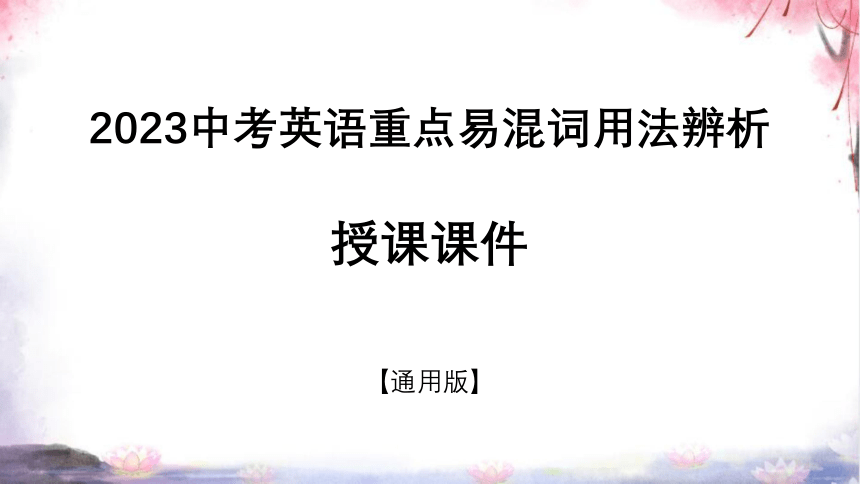 | |
| 格式 | pptx | ||
| 文件大小 | 1.4MB | ||
| 资源类型 | 试卷 | ||
| 版本资源 | 通用版 | ||
| 科目 | 英语 | ||
| 更新时间 | 2023-03-12 14:43:13 | ||
图片预览

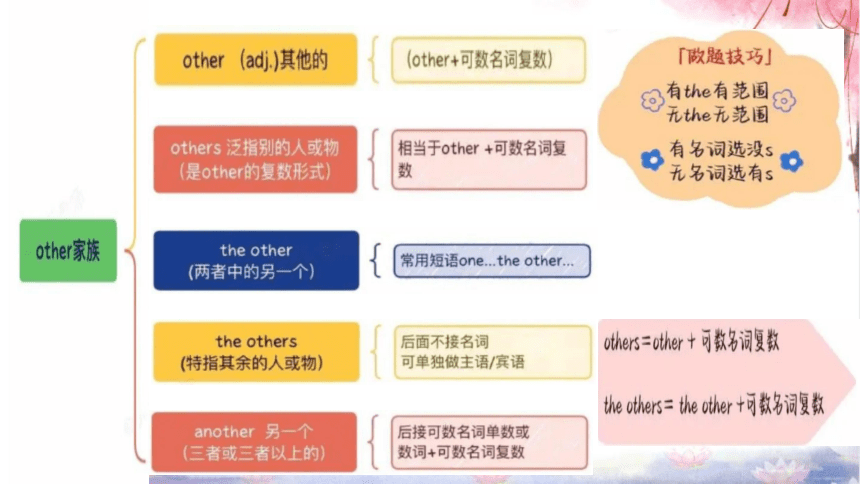
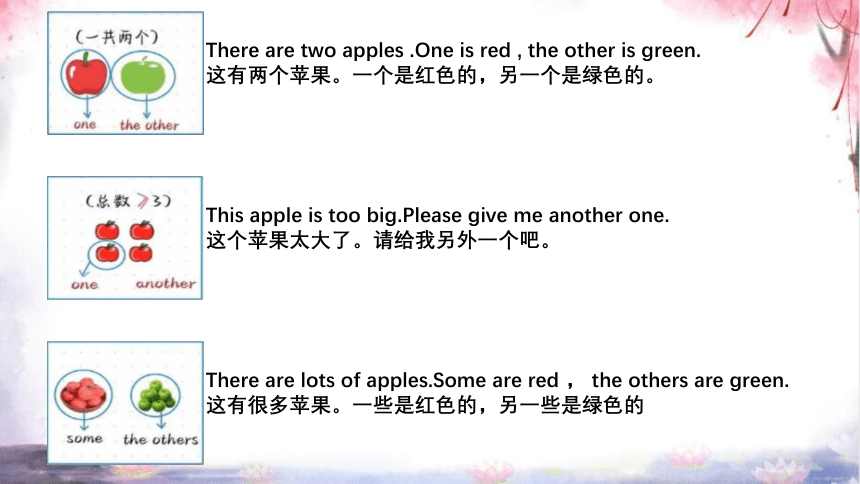
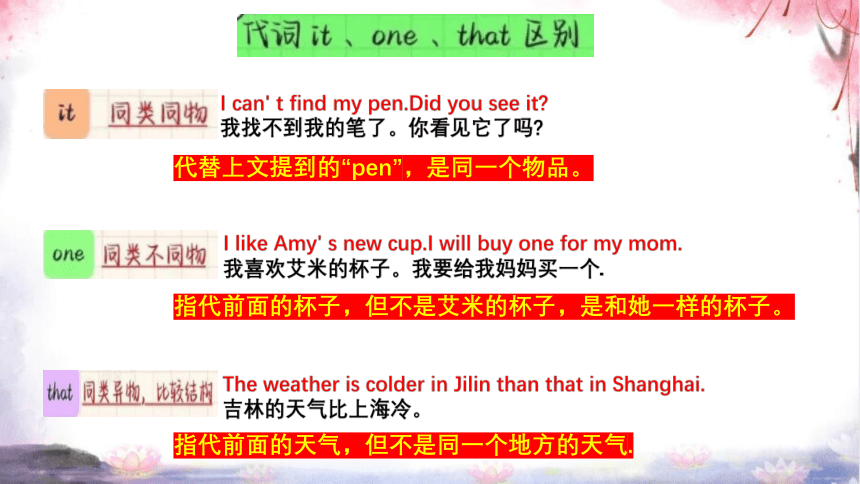
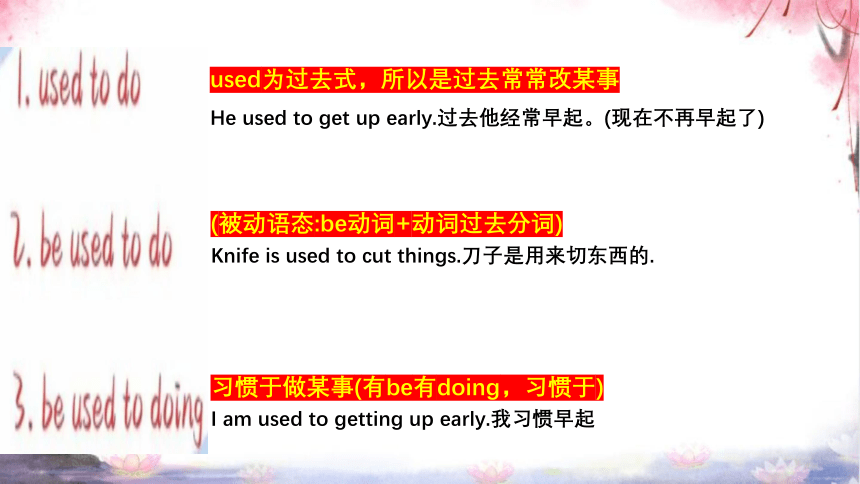
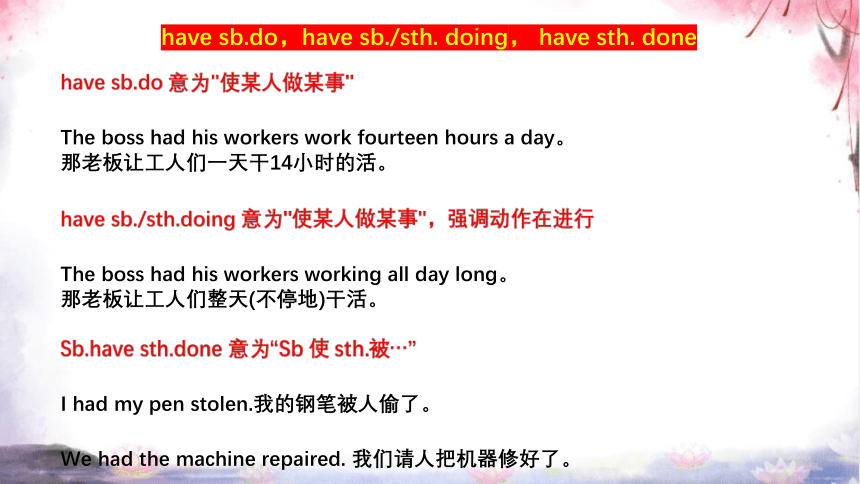
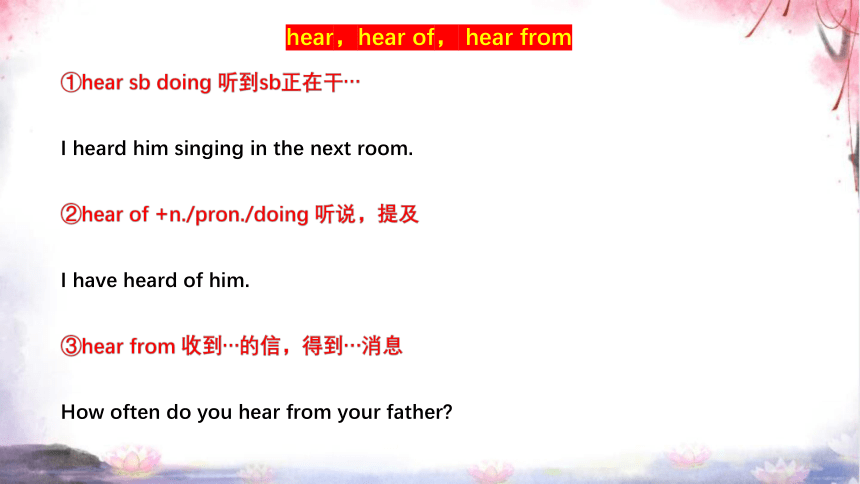
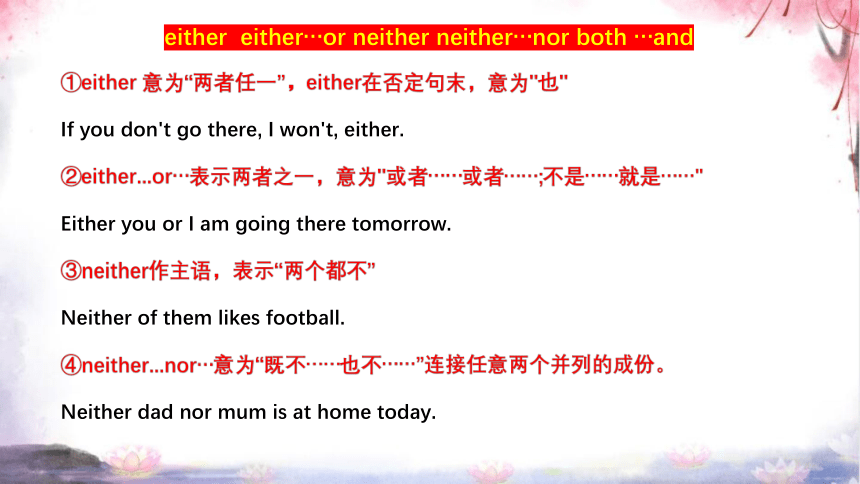
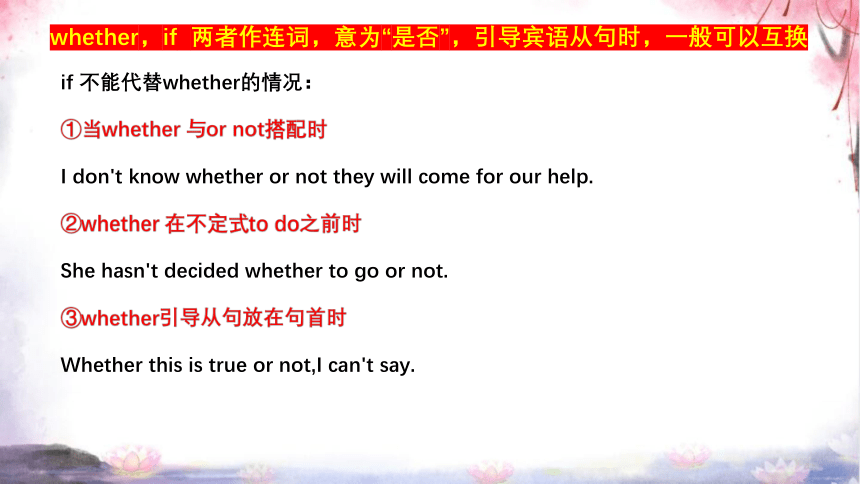
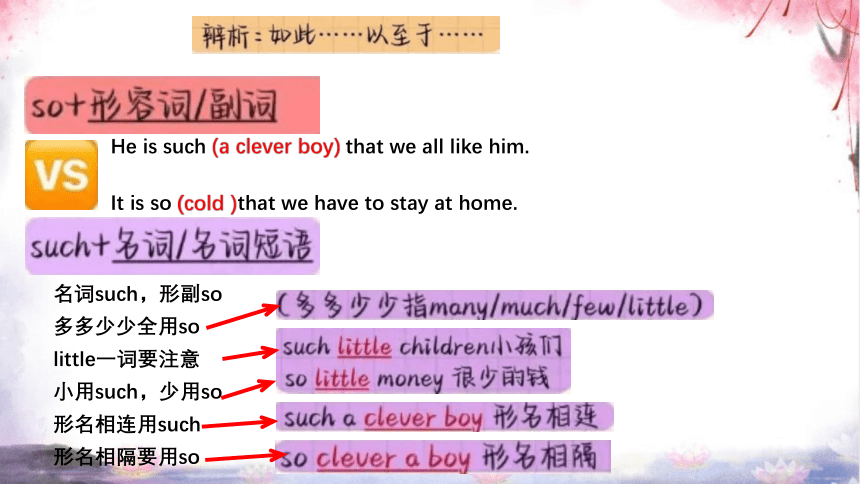
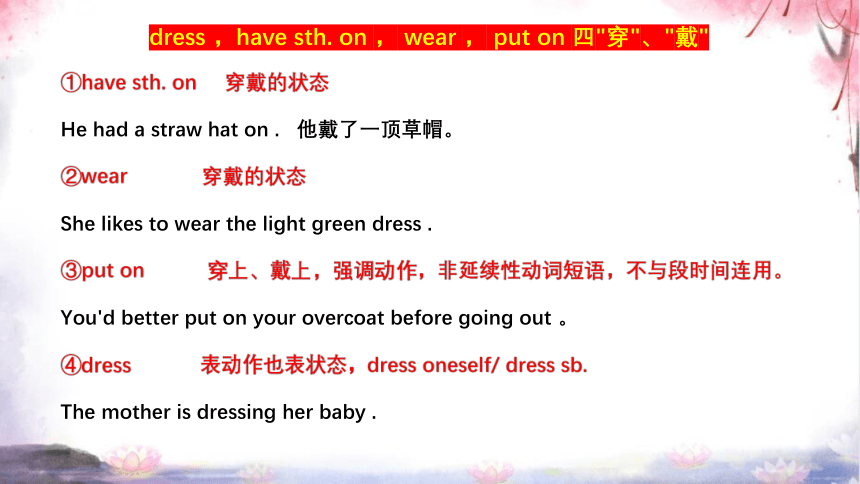
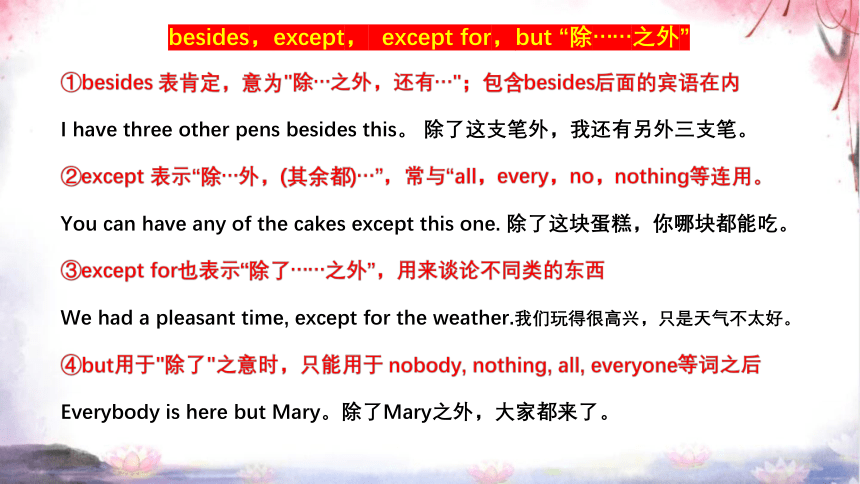
文档简介
(共32张PPT)
2023中考英语重点易混词用法辨析
授课课件
【通用版】
There are two apples .One is red , the other is green.
这有两个苹果。一个是红色的,另一个是绿色的。
This apple is too big.Please give me another one.
这个苹果太大了。请给我另外一个吧。
There are lots of apples.Some are red , the others are green.
这有很多苹果。一些是红色的,另一些是绿色的
I can' t find my pen.Did you see it
我找不到我的笔了。你看见它了吗
I like Amy' s new cup.I will buy one for my mom.
我喜欢艾米的杯子。我要给我妈妈买一个.
The weather is colder in Jilin than that in Shanghai.
吉林的天气比上海冷。
代替上文提到的“pen”,是同一个物品。
指代前面的杯子,但不是艾米的杯子,是和她一样的杯子。
指代前面的天气,但不是同一个地方的天气.
习惯于做某事(有be有doing,习惯于)
I am used to getting up early.我习惯早起
used为过去式,所以是过去常常改某事
(被动语态:be动词+动词过去分词)
Knife is used to cut things.刀子是用来切东西的.
He used to get up early.过去他经常早起。(现在不再早起了)
Sb.have sth.done 意为“Sb 使 sth.被…”
I had my pen stolen.我的钢笔被人偷了。
have sb.do,have sb./sth. doing, have sth. done
have sb.do 意为"使某人做某事"
have sb./sth.doing 意为"使某人做某事",强调动作在进行
The boss had his workers working all day long。
那老板让工人们整天(不停地)干活。
The boss had his workers work fourteen hours a day。
那老板让工人们一天干14小时的活。
We had the machine repaired. 我们请人把机器修好了。
③hear from 收到…的信,得到…消息
How often do you hear from your father
hear,hear of, hear from
①hear sb doing 听到sb正在干…
②hear of +n./pron./doing 听说,提及
I have heard of him.
I heard him singing in the next room.
④neither...nor…意为“既不……也不……”连接任意两个并列的成份。
Neither dad nor mum is at home today.
either either…or neither neither…nor both …and
①either 意为“两者任一”,either在否定句末,意为"也"
②either...or…表示两者之一,意为"或者……或者……;不是……就是……"
Either you or I am going there tomorrow.
Neither of them likes football.
③neither作主语,表示“两个都不”
If you don't go there, I won't, either.
Whether this is true or not,I can't say.
whether,if 两者作连词,意为“是否”,引导宾语从句时,一般可以互换
if 不能代替whether的情况:
I don't know whether or not they will come for our help.
②whether 在不定式to do之前时
③whether引导从句放在句首时
She hasn't decided whether to go or not.
①当whether 与or not搭配时
It is so (cold )that we have to stay at home.
He is such (a clever boy) that we all like him.
名词such,形副so
多多少少全用so
little一词要注意
小用such,少用so
形名相连用such
形名相隔要用so
④dress 表动作也表状态,dress oneself/ dress sb.
The mother is dressing her baby .
dress ,have sth. on , wear , put on 四"穿"、"戴"
①have sth. on 穿戴的状态
②wear 穿戴的状态
She likes to wear the light green dress .
You'd better put on your overcoat before going out 。
③put on 穿上、戴上,强调动作,非延续性动词短语,不与段时间连用。
He had a straw hat on . 他戴了一顶草帽。
④but用于"除了"之意时,只能用于 nobody, nothing, all, everyone等词之后
Everybody is here but Mary。除了Mary之外,大家都来了。
besides,except, except for,but “除……之外”
①besides 表肯定,意为"除…之外,还有…";包含besides后面的宾语在内
②except 表示“除…外,(其余都)…”,常与“all,every,no,nothing等连用。
You can have any of the cakes except this one. 除了这块蛋糕,你哪块都能吃。
We had a pleasant time, except for the weather.我们玩得很高兴,只是天气不太好。
③except for也表示“除了……之外”,用来谈论不同类的东西
I have three other pens besides this。 除了这支笔外,我还有另外三支笔。
As he was playing the piano,he was singing.
We are going to have entrance exams on June 12,2023.
as,when,while 当...的时候
① When:可与表示一个时间点或一个时间段的时间连用,从句动词可以是短暂性或延续性动词。从句的动作和主句的动作可以同时,也同先于主句的动作。
② While:从句中的谓语动词必须是延续性动词。强调主句和从句的动作同时发生。
Don't talk while you are eating。
③as:主句和从句的动作同时发生,意为“一边……,一边……”
I like writing to my pen-friend ,but it takes a lot of time.
When the teacher came in,the students stood up.
④ as well as 表示 “也,既…又…”
The girl is lively as well as healthy.这个女孩既活泼又健康。
also ,either , too , as well,as well as
① also用于肯定句. You study English and I also study it。
② either用于否定句,放在句尾;
You don't study English and I don't study it either。
She is going to Shanghai and her sister is going as well.
③too 和as well 用于肯定句,放在句末。as well常用作状语,意为“又;也”
It is important for you as well as for me. 这对我很重要,对你也很重要。
The chair is much too expensive.
He runs much too quickly.
too much, too many, much too
① too much + 不可数名词
② too many + 可数名词
She ate too many biscuits yesterday morning.
③ much too + 形容词、副词
There is too much milk in the basket.
③ sb. pays (some money) for sth.
He paid a lot of money for the building.
spend,pay cost,take
I spend ten yuan on the book.
②(Sb.) spend time (in) doing sth. 某人花了…(时间)做某事。
She spent ten minutes (in) getting there.
She spent two hours in drawing the house.
① (sb.) spend money/...for/on sth. 在......方面花钱;
④ (sth.)+cost(s)+sb.+money(life/health/time)... 某物花了某人…钱
This coat cost me eighty yuan.
⑤It+ takes/ took+ sb.+ some time+ to do sth. 花某人…(时间)做某事。
It takes us ten minutes to brush my teeth every day。
■spend、pay的主语必须是人
It took him half an hour to finish his homework.
Finifhing paiting the picture cost me more than three hours last ninght.
■cost、take的主语必须是物或事
They have little ink, do they 他们几乎没有墨水,是吗
few, little, a few, a little 都表示“少”
表肯定用:a few, a little;表否定用:few, little
She has a few Chinese friends, doesn't she 他有几位中国朋友,是吗
She has few Chinese friends, does she 他几乎没有几位中国朋友,是吗
They have a little ink, don't they 他们有一点墨水,是吗
② 修饰不可数名词用:little(表否), a little(表肯)
① 修饰可数名词:few(表否), a few(表肯)
④crossing, n. 意为“渡口,人行横道,(铁路与公路的)交叉点。
All the cars should stop before the zebra crossing.
cross,across ,through,crossing
①cross, v. 意为“横过, 穿过”, =walk(go,run)across
② across, prep. 意为“横过,穿过”, 放在动词之后
He walked across the field。
The ball went through the window。
③ through, prep. 意为“从…中间穿越”
Look both ways before you cross the road。
They feel like meeting their grandparents.
②like后+n./doing,意为“像”或“比如”
like、would like、feel like
① like后+n./doing,意为“喜欢”或“爱好”
③ would like… 用来表示“要”,would like to do
Would you like something to drink now
④ feel like doing
My parents would like to meet you.
l like swimming in the sea verymuch.
Mary has many interests,like singsing,dancing,running and so on.
④ some times 意为"几次、几倍"。
They have been there some times。
sometime; sometimes; some time; some times
① sometime, 与过去时或将来时连用,"(在过去或将来)某个时候"。
② some time,作名词短语时,意为"一些时间;一些时候"。
I'll be away for some time。
Sometimes I help my mother with the housework。
③ sometimes,adv.表时间频率,意为"有时"
I saw him sometime in May。
must, have to
must 表示说话人的主观看法; mustn't “不可以;不允许”;
—Must they play the violin —No,they needn’t/don’t have to.
have to 表示“不得不” don't have to 意为“不必”
My father had to work when he was ten years old.
The play is not interesting. I really must go now.
No one believes him since he is not hones.
none“一个也没有(既可指人, 也可指物) ”,作主语时可以跟of连用。
alone, lonely 孤独,独自
alone指客观存在的“孤独";
lonely更偏重一种主观感受上的“寂寞”。
Mary lived alone, but she didn't feel lonely.
no one指“没有一个人(只能指人, 不能用来指物) ", 意思与nobody相同。
no one, none
I went alone.我是一个人去的。
None of us is afraid of difficulties.
how long, how often, how soon
how long指多长时间, 主要用来对一段时间three days, four weeks等提问。
how often指多久一次, 主要用来对频度状语(如once a week等) 提问
—How often does he come here —Once a month.
—How soon can you come —In an hour.
how soon指多久以后, 对表示将来的一段时间in an hour, in two weeks等提问
How long ago was it
介词“4过”across,through,over,past
across=横穿/横过(从物体表面穿过)
Be careful when you across the street.
over 翻越/越过(从物体上方越过)
I jumped over the wall.
past 路过/经过(从物体旁边经过)
I went past a bank yesterday.
through=通过/穿过(从物T体内部穿过)
The sunlight comes through the window.
be in/at + 地点 可与How long,for 5 hours或since last weekend等段时间连用
They have been in Beijing for over two years.
arrive, get, reach,be in/at表示“到达”。
arrive + at较小的地方 arrive + in较大的地方
get之后通常接介词to
When we got to the park, it began to rain.
He reached Beijing yesterday.
reach是及物动词(较get更正式) , 其后可直接跟地点名词做宾语
They will arrive in Beijing next Monday.
We beat them.我们打败了他们。
win指“赢, 获胜”, 后面接比赛或名次。
among, between
between 一般指在两者之间,常与and连用,即“between...and...”。
among一般指在三个或三个以上的同类事物之中。
The teacher handed them out among the students.
beat是“打败, 优于”的意思, 后面接人或队。
beat, win“获胜,打败”
There is a table between two windows.
We won the match/game/race/the first place.
for + 一段时间,表示(已经有)...了,常用于完成时态的句子中。
I’ve had this car for about six years.
after, in“......(时间)以后”。
after + 一段时间, 表示过去一段时间之后, 常用于过去时态的句子中。
in + 一段时间,表将来一段时间以后,常用于将来时态的句子中。
She will go in three days.
She went after three days.
voice“声音” 多指说话声、歌声和笑声等,有时也作“意见,发言权”解。
He shouted at the top of voice.他高声呼喊。
noise, voice, sound
sound“声音” 指可以听到的任何声音, “听起来”,可做连系动词。
noise“噪音, 吵闹声” 指不悦耳, 不和谐的声音。
Another kind of pollution is noise.
The sound sounds terrible.
l have no voice in the matter.对于这件事,我没有发言权。
carry“运载, 携带”,无方向性
This bus is licensed to carry 100 passengers.这辆巴士准载一百人。
bring, take, carry, fetch“带”或“拿”
bring“带来, 拿来” bring-brought-brought
take“带去, 拿去” take-took-taken
Take the box away, please.
Don't forget to bring me a photo of your family.
fetch则表示“去拿来”的意思。
Please fetch me the documents in that room.
2023中考英语重点易混词用法辨析
授课课件
【通用版】
There are two apples .One is red , the other is green.
这有两个苹果。一个是红色的,另一个是绿色的。
This apple is too big.Please give me another one.
这个苹果太大了。请给我另外一个吧。
There are lots of apples.Some are red , the others are green.
这有很多苹果。一些是红色的,另一些是绿色的
I can' t find my pen.Did you see it
我找不到我的笔了。你看见它了吗
I like Amy' s new cup.I will buy one for my mom.
我喜欢艾米的杯子。我要给我妈妈买一个.
The weather is colder in Jilin than that in Shanghai.
吉林的天气比上海冷。
代替上文提到的“pen”,是同一个物品。
指代前面的杯子,但不是艾米的杯子,是和她一样的杯子。
指代前面的天气,但不是同一个地方的天气.
习惯于做某事(有be有doing,习惯于)
I am used to getting up early.我习惯早起
used为过去式,所以是过去常常改某事
(被动语态:be动词+动词过去分词)
Knife is used to cut things.刀子是用来切东西的.
He used to get up early.过去他经常早起。(现在不再早起了)
Sb.have sth.done 意为“Sb 使 sth.被…”
I had my pen stolen.我的钢笔被人偷了。
have sb.do,have sb./sth. doing, have sth. done
have sb.do 意为"使某人做某事"
have sb./sth.doing 意为"使某人做某事",强调动作在进行
The boss had his workers working all day long。
那老板让工人们整天(不停地)干活。
The boss had his workers work fourteen hours a day。
那老板让工人们一天干14小时的活。
We had the machine repaired. 我们请人把机器修好了。
③hear from 收到…的信,得到…消息
How often do you hear from your father
hear,hear of, hear from
①hear sb doing 听到sb正在干…
②hear of +n./pron./doing 听说,提及
I have heard of him.
I heard him singing in the next room.
④neither...nor…意为“既不……也不……”连接任意两个并列的成份。
Neither dad nor mum is at home today.
either either…or neither neither…nor both …and
①either 意为“两者任一”,either在否定句末,意为"也"
②either...or…表示两者之一,意为"或者……或者……;不是……就是……"
Either you or I am going there tomorrow.
Neither of them likes football.
③neither作主语,表示“两个都不”
If you don't go there, I won't, either.
Whether this is true or not,I can't say.
whether,if 两者作连词,意为“是否”,引导宾语从句时,一般可以互换
if 不能代替whether的情况:
I don't know whether or not they will come for our help.
②whether 在不定式to do之前时
③whether引导从句放在句首时
She hasn't decided whether to go or not.
①当whether 与or not搭配时
It is so (cold )that we have to stay at home.
He is such (a clever boy) that we all like him.
名词such,形副so
多多少少全用so
little一词要注意
小用such,少用so
形名相连用such
形名相隔要用so
④dress 表动作也表状态,dress oneself/ dress sb.
The mother is dressing her baby .
dress ,have sth. on , wear , put on 四"穿"、"戴"
①have sth. on 穿戴的状态
②wear 穿戴的状态
She likes to wear the light green dress .
You'd better put on your overcoat before going out 。
③put on 穿上、戴上,强调动作,非延续性动词短语,不与段时间连用。
He had a straw hat on . 他戴了一顶草帽。
④but用于"除了"之意时,只能用于 nobody, nothing, all, everyone等词之后
Everybody is here but Mary。除了Mary之外,大家都来了。
besides,except, except for,but “除……之外”
①besides 表肯定,意为"除…之外,还有…";包含besides后面的宾语在内
②except 表示“除…外,(其余都)…”,常与“all,every,no,nothing等连用。
You can have any of the cakes except this one. 除了这块蛋糕,你哪块都能吃。
We had a pleasant time, except for the weather.我们玩得很高兴,只是天气不太好。
③except for也表示“除了……之外”,用来谈论不同类的东西
I have three other pens besides this。 除了这支笔外,我还有另外三支笔。
As he was playing the piano,he was singing.
We are going to have entrance exams on June 12,2023.
as,when,while 当...的时候
① When:可与表示一个时间点或一个时间段的时间连用,从句动词可以是短暂性或延续性动词。从句的动作和主句的动作可以同时,也同先于主句的动作。
② While:从句中的谓语动词必须是延续性动词。强调主句和从句的动作同时发生。
Don't talk while you are eating。
③as:主句和从句的动作同时发生,意为“一边……,一边……”
I like writing to my pen-friend ,but it takes a lot of time.
When the teacher came in,the students stood up.
④ as well as 表示 “也,既…又…”
The girl is lively as well as healthy.这个女孩既活泼又健康。
also ,either , too , as well,as well as
① also用于肯定句. You study English and I also study it。
② either用于否定句,放在句尾;
You don't study English and I don't study it either。
She is going to Shanghai and her sister is going as well.
③too 和as well 用于肯定句,放在句末。as well常用作状语,意为“又;也”
It is important for you as well as for me. 这对我很重要,对你也很重要。
The chair is much too expensive.
He runs much too quickly.
too much, too many, much too
① too much + 不可数名词
② too many + 可数名词
She ate too many biscuits yesterday morning.
③ much too + 形容词、副词
There is too much milk in the basket.
③ sb. pays (some money) for sth.
He paid a lot of money for the building.
spend,pay cost,take
I spend ten yuan on the book.
②(Sb.) spend time (in) doing sth. 某人花了…(时间)做某事。
She spent ten minutes (in) getting there.
She spent two hours in drawing the house.
① (sb.) spend money/...for/on sth. 在......方面花钱;
④ (sth.)+cost(s)+sb.+money(life/health/time)... 某物花了某人…钱
This coat cost me eighty yuan.
⑤It+ takes/ took+ sb.+ some time+ to do sth. 花某人…(时间)做某事。
It takes us ten minutes to brush my teeth every day。
■spend、pay的主语必须是人
It took him half an hour to finish his homework.
Finifhing paiting the picture cost me more than three hours last ninght.
■cost、take的主语必须是物或事
They have little ink, do they 他们几乎没有墨水,是吗
few, little, a few, a little 都表示“少”
表肯定用:a few, a little;表否定用:few, little
She has a few Chinese friends, doesn't she 他有几位中国朋友,是吗
She has few Chinese friends, does she 他几乎没有几位中国朋友,是吗
They have a little ink, don't they 他们有一点墨水,是吗
② 修饰不可数名词用:little(表否), a little(表肯)
① 修饰可数名词:few(表否), a few(表肯)
④crossing, n. 意为“渡口,人行横道,(铁路与公路的)交叉点。
All the cars should stop before the zebra crossing.
cross,across ,through,crossing
①cross, v. 意为“横过, 穿过”, =walk(go,run)across
② across, prep. 意为“横过,穿过”, 放在动词之后
He walked across the field。
The ball went through the window。
③ through, prep. 意为“从…中间穿越”
Look both ways before you cross the road。
They feel like meeting their grandparents.
②like后+n./doing,意为“像”或“比如”
like、would like、feel like
① like后+n./doing,意为“喜欢”或“爱好”
③ would like… 用来表示“要”,would like to do
Would you like something to drink now
④ feel like doing
My parents would like to meet you.
l like swimming in the sea verymuch.
Mary has many interests,like singsing,dancing,running and so on.
④ some times 意为"几次、几倍"。
They have been there some times。
sometime; sometimes; some time; some times
① sometime, 与过去时或将来时连用,"(在过去或将来)某个时候"。
② some time,作名词短语时,意为"一些时间;一些时候"。
I'll be away for some time。
Sometimes I help my mother with the housework。
③ sometimes,adv.表时间频率,意为"有时"
I saw him sometime in May。
must, have to
must 表示说话人的主观看法; mustn't “不可以;不允许”;
—Must they play the violin —No,they needn’t/don’t have to.
have to 表示“不得不” don't have to 意为“不必”
My father had to work when he was ten years old.
The play is not interesting. I really must go now.
No one believes him since he is not hones.
none“一个也没有(既可指人, 也可指物) ”,作主语时可以跟of连用。
alone, lonely 孤独,独自
alone指客观存在的“孤独";
lonely更偏重一种主观感受上的“寂寞”。
Mary lived alone, but she didn't feel lonely.
no one指“没有一个人(只能指人, 不能用来指物) ", 意思与nobody相同。
no one, none
I went alone.我是一个人去的。
None of us is afraid of difficulties.
how long, how often, how soon
how long指多长时间, 主要用来对一段时间three days, four weeks等提问。
how often指多久一次, 主要用来对频度状语(如once a week等) 提问
—How often does he come here —Once a month.
—How soon can you come —In an hour.
how soon指多久以后, 对表示将来的一段时间in an hour, in two weeks等提问
How long ago was it
介词“4过”across,through,over,past
across=横穿/横过(从物体表面穿过)
Be careful when you across the street.
over 翻越/越过(从物体上方越过)
I jumped over the wall.
past 路过/经过(从物体旁边经过)
I went past a bank yesterday.
through=通过/穿过(从物T体内部穿过)
The sunlight comes through the window.
be in/at + 地点 可与How long,for 5 hours或since last weekend等段时间连用
They have been in Beijing for over two years.
arrive, get, reach,be in/at表示“到达”。
arrive + at较小的地方 arrive + in较大的地方
get之后通常接介词to
When we got to the park, it began to rain.
He reached Beijing yesterday.
reach是及物动词(较get更正式) , 其后可直接跟地点名词做宾语
They will arrive in Beijing next Monday.
We beat them.我们打败了他们。
win指“赢, 获胜”, 后面接比赛或名次。
among, between
between 一般指在两者之间,常与and连用,即“between...and...”。
among一般指在三个或三个以上的同类事物之中。
The teacher handed them out among the students.
beat是“打败, 优于”的意思, 后面接人或队。
beat, win“获胜,打败”
There is a table between two windows.
We won the match/game/race/the first place.
for + 一段时间,表示(已经有)...了,常用于完成时态的句子中。
I’ve had this car for about six years.
after, in“......(时间)以后”。
after + 一段时间, 表示过去一段时间之后, 常用于过去时态的句子中。
in + 一段时间,表将来一段时间以后,常用于将来时态的句子中。
She will go in three days.
She went after three days.
voice“声音” 多指说话声、歌声和笑声等,有时也作“意见,发言权”解。
He shouted at the top of voice.他高声呼喊。
noise, voice, sound
sound“声音” 指可以听到的任何声音, “听起来”,可做连系动词。
noise“噪音, 吵闹声” 指不悦耳, 不和谐的声音。
Another kind of pollution is noise.
The sound sounds terrible.
l have no voice in the matter.对于这件事,我没有发言权。
carry“运载, 携带”,无方向性
This bus is licensed to carry 100 passengers.这辆巴士准载一百人。
bring, take, carry, fetch“带”或“拿”
bring“带来, 拿来” bring-brought-brought
take“带去, 拿去” take-took-taken
Take the box away, please.
Don't forget to bring me a photo of your family.
fetch则表示“去拿来”的意思。
Please fetch me the documents in that room.
同课章节目录
- 词法
- 名词
- 动词和动词短语
- 动词语态
- 动词时态
- 助动词和情态动词
- 非谓语动词
- 冠词
- 代词
- 数词和量词
- 形容词副词及其比较等级
- 介词和介词短语
- 连词和感叹词
- 构词法
- 相似、相近词比较
- 句法
- 陈述句
- 一般疑问句和否定疑问句
- 特殊疑问句及选择疑问句
- 反意疑问句
- 存在句(There be句型)
- 宾语从句
- 定语从句
- 状语从句
- 主谓一致问题
- 简单句
- 并列句
- 复合句
- 主谓一致
- 主、表语从句
- 名词性从句
- 直接引语和间接引语
- 虚拟语气
- 感叹句
- 强调句
- 倒装句
- 祈使句
- 句子的成分
- 句子的分类
- 题型专区
- 单项选择部分
- 易错题
- 完形填空
- 阅读理解
- 词汇练习
- 听说训练
- 句型转换
- 补全对话
- 短文改错
- 翻译
- 书面表达
- 任务型阅读
- 语法填空
- 其他资料
